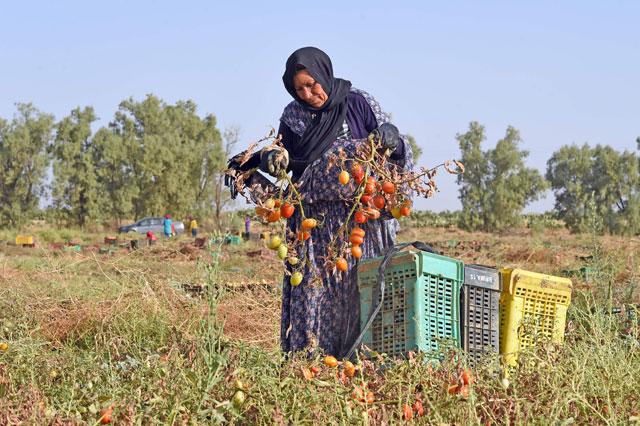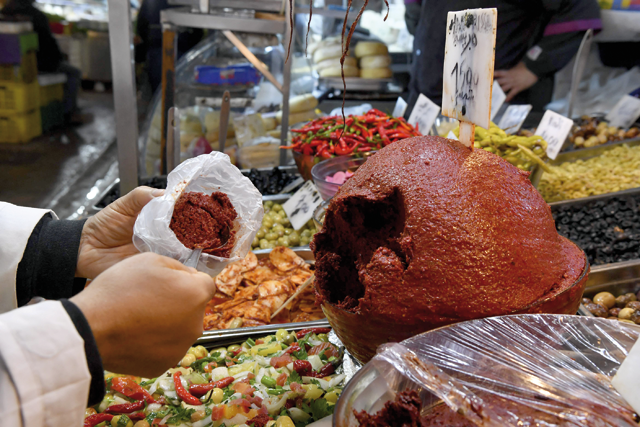You are here
Women in rural Tunisia mix hot sauce with business
By AFP - Dec 07,2017 - Last updated at Dec 07,2017

A Tunisian woman picks tomatoes in a field in Menzel Mheri on July 13, in the governorate of Kairouan (AFP photo)
MENZEL MHIRI, Tunisia — These Tunisian women have some sauce, pooling their resources and a seasoned culinary expertise handed down the centuries from mother to daughter.
Their secret? Harissa — the spicy hot pepper paste used to add zing to dishes traditionally prepared in North Africa's Maghreb region.
These days, when Najoua Dhiflaoui prepares harissa, it is no longer just for her family. She and another 150 women are now making money by producing and even exporting their ancestral savoir faire.
Harissa, made from sun-dried chilli peppers, freshly prepared spices and olive oil to both preserve and soften its heat, is added to most dishes in restaurants in Tunisia, and is also popular abroad.
In 2013, a group of women farmers in Menzel Mhiri near Kerouan in rural central Tunisia banded together to form a cooperative they dubbed "Tahadi" — Arabic for "challenge".
Dhiflaoui and her co-workers certainly rose to it.
They went "door-to-door to convince others to join them, to combine their knowledge and sell their products together", the dynamic fortysomething told AFP.
The women were able to take advantage of an official project to support local produce and were given training in the technical, hygienic and commercial aspects of their venture.
For the past two years, they have marketed their harissa under the "Errim" trade name. That's Arabic for small gazelle, also a symbol of feminine beauty.
Real confidence booster
"It's a way of representing the Tunisian woman — hard-working, authentic and fiery," said Dhiflaoui with a smile, her forehead beaded with sweat from both the heat and the peppers.
Tahadi now has 164 people working for it, and is one of the first firms in Tunisia to work exclusively with local rural women under a rotational system — its members work according to a flexible schedule.
In a spotless white laboratory lined with machinery that grinds, kneads and fills, the gloved women wash and prepare locally harvested ingredients to make the red paste.
Women play a key role in the Tunisian economy, said Farouk Ben Salah of PAMPAT, a UN, Swiss and Tunisian project aimed at getting rural products such as harissa onto the market.
"The main thing is to create working conditions for them as soon as possible," he said.
The harissa makers are paid "slightly more than the agricultural wage, around 15 dinars [five euros] per working day“, said Ben Salah.
Others work from home, performing essential tasks for the project and generating some income by cleaning and drying peppers on the roofs of their houses.
Dhiflaoui is full of enthusiasm. "This work allows women a certain financial autonomy," she said, boosting their confidence and enabling them "to move forward".
'Her own monthly salary'
Since the launch of the cooperative, the farmers "have encouraged each other to make their mark. No longer do you have to be a teacher or doctor, now they too can work and feel they have a place in society".
Women in rural Tunisia are particularly affected by gender discrimination and lack of job security.
While female unemployment is 22.5 per cent at a national level, the rate exceeds 35 per cent in rural provinces, according to a 2015 report by the National Institute of Statistics.
Dhiflaoui said that many of the women who now work at Tahadi used to labour in the fields in "terrible conditions" or "waited until their husbands brought money home".
Their new role has "made them bloom" and given them "liberty", she added.
"There's a big difference between a woman with her own monthly salary and a woman who relies on a husband," said Chelbia Dhiflaoui, Najoua's cousin who also works at Tahadi.
"She feels a sense of responsibility, she sets goals she can reach — and she's working to improve her living conditions."
Ben Salah said PAMPAT could help Tahadi diversify its production to give the cooperative more opportunities to employ women who live in rural areas.
Errim Harissa is already making a name for itself.
Sold in gourmet food stores nationally, it can also be found in Switzerland and Germany, and orders have been dispatched to France and Italy.
Talks are also underway to export the delicacy to Canada.
Related Articles
TUNIS — UNESCO on Thursday added Tunisia’s spicy national condiment Harissa to its list of intangible cultural heritage, saying it was part
TUNIS — Two Tunisian sisters living in France were among at least 128 people killed in Paris after travelling there to celebrate a birthday,
TUNIS — The UAE, which angered Tunisia by banning Tunisian women from its passenger flights, has intelligence that female extremists returni
















